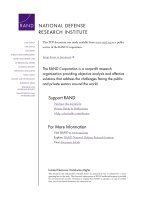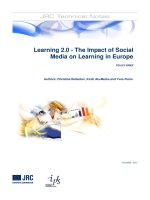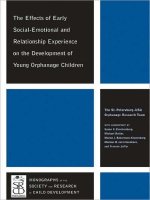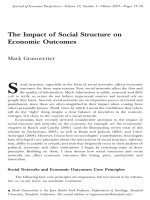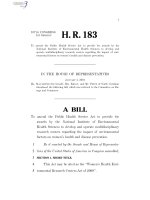What Changes Are Being Made to Social Assistance Benefits: A Community Perspective on the Impact of these Changes. pdf
Bạn đang xem bản rút gọn của tài liệu. Xem và tải ngay bản đầy đủ của tài liệu tại đây (564.19 KB, 18 trang )
What Changes Are Being Made to
Social Assistance Benefits:
A Community Perspective on the
Impact of these Changes.
Table of Contents
I. Background on Provincial Budget Cuts to Social Assistance …………… 3
Cap on health and non- health related discretionary benefits.……… 4
Community Start-Up and Maintenance Benefit (CSUMB)….……… 5
Home Repairs Benefit………………………………………………… 6
Schedule A: list of discretionary benefits currently available……… 7
II. Community Meeting on June 21, 2012………………………………… 8
III. Potholes or People: What the changes mean for people on Ontario
Works and Ontario Disability Support Program……………………… 10
Group Discussion Report…………………………………………… 10
Health Benefits…………………………………………………………10
Children and Families………………………………………………… 12
Travel and Transportation Benefit……………………………………. 14
Housing Supports/ Community Start-Up and Maintenance Benefit…. 15
IV. Conclusion……………………………………………………………… 17
V. Next Steps………………………………………………………………… 17
VI. Sources………………………………………………………………… 18
3
I. Background on Provincial Budget Cuts to Social Assistance
The Ontario Provincial Budget 2012 contains the largest reductions in benefits to people on
social assistance since the Liberals first formed the government in 2003. While an extra $55
million is being added to monthly benefit rates, approximately $133 million annually is being
removed from direct benefits to people on Ontario Works (OW) and the Ontario Disability Sup-
port Program (ODSP):
$20 million as a result of the new overall cap on discretionary health and non-
health related benefits, to take effect July 1, 2012;
$110 million through the elimination of the Community Start Up and Maintenance
Benefits (note: while 50% of CSUMB money is being transferred to municipalities,
there is no guarantee that these funds will continue to be administered as direct
benefits; in addition, the funds may be used to provide services to all low-income
people, not only people on Ontario Works and ODSP);
$3 million from the elimination of the Home Repairs Benefit.
This means a net reduction of $78 million in direct benefits, which will have serious implica-
tions for people on OW and ODSP. It will undoubtedly mean that the government will not
meet its target of reducing child and family poverty by 25% by 2013, as promised in Ontar-
io’s Poverty Reduction Strategy.
“Cutting these benefits will push people further into poverty,
isolation and segregation.”
-quote from Community Meeting, June 21, 2012
4
Cap on health and non- health related discretionary benefits
Budget 2012 announced changes that will replace the previous provincial funding formula for
health and non-health related discretionary benefits delivered through Ontario Works and the
ODSP. Those health-related benefits that are currently provided to people on ODSP will
continue to be delivered as a mandatory benefit without change. Health-related benefits are
costs like basic dental services, eyeglasses, and hearing aids for adults, as well as funerals and
burials. Non-health related benefits are for items like transit subsidies and recreational subsidies
for children. (See Schedule A on page 7 for a complete list of discretionary benefits currently
available in Peterborough and the projected 2012 budget amount for each).
The new cap on the amount of money the province gives to municipalities means that municipali-
ties will either have to dramatically increase their own financial contribution to benefits or reduce
the benefits that are provided. The provincial government expects to save about $20 million annu-
ally with the new funding cap.
The effect of the cap will be different depending on what each municipality decides to do in re-
sponse. Joint Services Committee of Peterborough City and County has recommended that that
the two municipalities pick up the $314,000 short fall in provincial funding through to the end of the
2012. Furthermore, as part of their budget decision-making in the fall, local municipal govern-
ments will have to deal with the estimated cut of $920,000 in provincial funding for discretionary
benefits going forward in 2013.
The effect of the cap will be different depending on what
each municipality decides to do in response.
“I’m diabetic and on ODSP. I needed discretionary benefits to
pay for a special boot because I have ulcers. The boot costs $600
and is not covered by ODSP health benefits. If I didn’t have the
boot I would lose my foot, and then the costs to the health care
system would be ridiculously high.”
-quote from Community Meeting, June 21, 2012
5
CSUMB has been important for families on Ontario works and ODSP in Peterborough City/County. In
2011 local families on Ontario Works received $1.97 million in CSUMB. A further $0.83 million in
CSUMB was paid to ODSP recipients. Of the total $2.8 million provided in CSUMB, $270,000 was
funded by the Municipality. The Municipality has not decided what it will do to replace the CSUMB, or
what it will do with the savings that it will have ($270,000) as a result of the elimination of the benefit.
The Provincial government has said that half of the $110 million that currently goes to CSUMB (or
about $55 million) will be moved to the Ministry of Housing and folded in with funding from five other
programs, which were already slated to be consolidated under the government’s Long-Term
Affordable Housing Strategy. The new consolidated money will be given to municipalities to fund
housing and homelessness programs for all low-income people. New criteria for the way municipali-
ties will deliver these programs have not yet been created. The reduced funding will not be part of
the social assistance program, and so decisions denying funding will not be appealable.
“Rates are too low to cover even rent and food. The term
‘discretionary benefits’ is misleading - really they should be called
‘necessary benefits’.”
-quote from Community Meeting, June 21, 2012
Community Start-Up and Maintenance Benefit (CSUMB) ends
January, 2013
The Provincial government will end the CSUMB as of January 1, 2013. This is going to have a
serious impact on families who rely on social assistance for income support.
CSUMB is a mandatory benefit that is used to help families pay for the initial costs of establishing a
new home (last month’s rent deposit, heat/hydro deposits, moving costs, furniture and other
necessities) and/or to pay costs to prevent eviction or disconnection of heat or utilities. Currently,
about 16,000 Ontario Works and ODSP recipients across the province rely on CSUMB every month
to pay for costs like these. CSUMB is a mandatory benefit. Because CSUMB is a mandatory
benefit, a decision denying CSUMB funding can be appealed to the Social Benefits Tribunal.
CSUMB funds are intended to help families either set up a new home or keep the home they have.
It makes sense that any decision to deny these funds should be subject to review.
6
Home Repairs Benefit ends January, 2013
The Home Repairs Benefit will also be cut as of January 1, 2013. It helps people pay for things like
emergency plumbing repairs, patching a leaky roof, or repairing damage from fire or floods, but only if
there’s no other source of funds that people can use. The $3 million for this benefit is not being moved
into the Ministry of Housing.
“I have bedbugs and it is horrible. I can’t throw out my bed
because I am still paying on it.”
-quote from Community Meeting, June 21, 2012
7
Schedule A
Benefit and/or Service 2012 Projections
Basic Dental Services for OW adults and
ODSP dependent adults
$579,431 1.
Dentures $183,288 2.
Vision care for OW adults and ODSP depend-
ent adults
$160,591 3.
Prosthetic Appliances $66,227 4.
Hearing Aids and Batteries $8,142 5.
Travel and Transportation $453,957 6.
Basic funeral and burials services $213,011 7.
Baby supplies and equipment $70,536 8.
Paternity Testing Included in #14 9.
Prescription Drugs $13, 712 10.
Moving and storage costs $3,800 11.
Home repairs for OW families who own their
own homes
$3,790 12.
Vocational Training N/A 13.
Birth verification $4,080 14.
Replacement or repair to fridge or stove $18,658 15.
Replacement of household contents in an
emergency situation
Combined with #15 16.
Rent deposits $2,738 17.
Heat and Utility deposits or payment to prevent
eviction or disconnection of services
$5,779 18.
19. Recreation and social activities subsidies for
children
$162,699
8
II. Community Meeting on June 21, 2012
Reducing and alleviating poverty has been the focus of collaborative initiatives by the Peterborough
Poverty Reduction Network (PPRN) and its partners, the Peterborough Community Legal Centre
(Legal Centre), the Peterborough County-City Health Unit (PCCHU) and the Peterborough Social
Planning Council (PSPC), among others.
These partners have investigated the implications of the 2012 budget cuts to provincial funding of
social assistance on Peterborough City and County. One indisputable implication is that over the
upcoming months municipal governments will need to make key funding decisions for the balance of
2012 and going forward to 2013.
Peterborough has a higher percentage of people on assistance than other
municipality in the region, with 8.5% of local residents relying on social
assistance compared to a provincial average of 6.9%.
One of every 11 residents relies on social assistance for food, shelter and other important benefits
relating to health care, dental care, transportation, and housing. There are relatively high levels of
poverty in Peterborough City and County. The area has historically had a high percentage of house-
holds below the low income cut off (LICO).
Given the critical importance of the benefits in question to the poorest residents in the community, it is
essential that people who rely on Ontario Works and ODSP be asked how the cuts will affect them.
Accordingly, any interested member of the public and agencies who serve people on social assistance
were invited to attend a community meeting on June 21, 2012 to:
hear how the province has reduced funding for important benefits;
learn what the City and County of Peterborough are considering doing in
response to the changes, and about the process for municipal decision-
making;
discover what provincial and local actions are taking place in response to
the changes;
have a chance to say what the changes will mean for people on Ontario
Works and ODSP.
9
One of every 11 residents relies on social assistance for
food, shelter and other important benefits relating to
health care, dental care, transportation, and housing.
Community Meeting on June 21, 2012, Cont’d:
Seventy-five people attended the meeting at the Peterborough Public Library, representing 19 local
agencies and various individuals with lived experience of Ontario Works and ODSP.
As part of background presentations made at the beginning of the meeting, Martha Macfie, staff
lawyer with the Legal Centre, told those in attendance that “Municipal government must make hard
choices in the upcoming months about funding priorities for 2013 given the cuts.” She outlined how
the ongoing upload of the municipal cost share of OW to the province has resulted in municipal sav-
ings that will increase each year until the upload is complete in 2018. Ms. Macfie pointed out that
there is currently an estimated $3.5 million in the social services reserve fund, and asserted that the
savings from uploading and the social services reserves could be used to offset the drop in funding
from the province for social assistance benefits.
John Coreno, Social Services Coordinator for the City of Peterborough, outlined the “Discretionary
Benefit Report” that was presented by the City staff to the Joint Services Committee on June 14th,
2012. According to Mr. Coreno, the Committee’s recommendation was to continue the current
range of Discretionary Benefits through to the end of 2012, which would require an increased cost
to the City of $300,140 and $14,368 from the County.
Joanne Bazak-Brokking, Co-chair of Peterborough Poverty Reduction Network’s (PPRN) Income
Security Work Group, told those in attendance that the cuts “are plunging people deeper into pov-
erty.” She also encouraged those in attendance to get involved in provincial campaigns aimed at
refocusing the provincial government on its 2009 commitment to poverty reduction.
“Municipal government must make hard choices in the upcoming
months about funding priorities for 2013 given the cuts.”
- Martha Macfie, staff lawyer with the Peterborough Legal Centre and Co-Chair of the Income Security Work Group
10
III. Potholes or People: What the changes mean for people on
Ontario Works and ODSP
“We have to tell Council what to decide and not have them
decide for us.”
-quote from Community Meeting, June 21, 2012
Health Benefits:
Cuts to these discretionary benefits will hurt families on Ontario
Works the most.
Current coverage of some health items for people on ODSP is
limited, and so getting discretionary benefits can be critical.
A person who is poor may also be hungry, sick or homeless and
bouncing from crisis to crisis. Expecting that person to go around
and beg service clubs for money to cover health costs is not
realistic. It is cruel.
The charity model does not work.
A lot of minimum wage workers don’t have drug or dental benefits.
That is wrong. But it doesn’t help them to take these away from
people on assistance who are even poorer and sicker.
Dental, Vision, Hearing, Orthotics, Other: Loss of basic dental
services for adults on Ontario Works will have a devastating effect
on people. People won’t be able to find work, pay taxes or stay
healthy.
Good dental hygiene is important for healthy pregnancies.
Cutting these benefits would result in short term savings but
greatly increased long-term costs.
These important
health benefits
should be covered
because this will re-
sult in significant
future savings to the
healthcare system.
“My doctor said I
need a blood pressure
cuff. ODSP would
not cover it and sent
me to Ontario Works.
First OW said no, but
they finally did cover
it. This was very
stressful.”
-quote from Community Meeting, June
21, 2012
Group Discussion Report:
In small groups people talked about what the impact would be of the
various proposed changes to social assistance benefits. These were
grouped into the themes of health, children and families, travel and
transportation, and housing benefits. Each of these themes is
presented separately.
11
Not having glasses or a hearing aid is a safety issue, both for the
person who needs the appliances and for other members of the
community. A person who cannot see or hear well will become
isolated, insecure and depressed.
Dentures: Without dentures, peoples’ health will deteriorate.
When people can’t eat properly they have poor nutrition, and lack
energy. Then they can’t look after themselves or their children
properly. They can’t look for work.
Right now there is only partial funding for dentures. One woman
could not make up the cost and was going without teeth/dentures.
It was affecting what she could eat and her overall health was in
decline.
Funeral and Burial Services: Removal of this benefit would be
de-humanizing for poor families, who would be forced to leave
bodies unclaimed so that the cost would be minimally covered as
required by law. Even families of people who have plots pur-
chased won’t use them, because of the cost of a funeral service.
Prescription Drugs: Some people are only able to buy critical
medications through discretionary benefits because they are not
covered by the Ontario Drug Plan.
Removing this benefit will raise the cost of other forms of health
care that will result from inadequate treatment in the first place.
Mothers won’t be able to get the prescribed, specialized formulas
they sometimes need for their babies to thrive.
How Will People Cope with the Cuts?: People who are re-
sourceful will go to other agencies and services (e.g. churches,
the Hearing Society, service clubs), and compete for scarce re-
sources, but others will become more isolated and sick.
“I’m diabetic and need eye care by taking that away
they are sentencing me to blindness.”
-quote from Community Meeting, June 21, 2012
“It seems like the
government doesn’t
think low income
people care about
how they look.”
-quote from Community Meeting,
June 21, 2012
“I am getting den-
tal work done now.
No one will hire
me if I have rotting
teeth.”
-quote from Community Meeting,
June 21, 2012
“OHIP should be covering dental.” -quote from Community Meeting, June 21, 2012
12
Children and Families:
General Comments:
Any cuts to child and family support will result in:
more family abuse and domestic stress;
more alcoholism and drug abuse;
increases in crime;
increased mental health stress and suicide;
more family breakdown;
the CAS will become increasingly involved and families will be disrupted;
families will not be able to meet their children’s needs and purchase the supplies they need to look
after them. These are basic necessities for new families.
Recreation:
Research has shown that physical activity greatly benefits a child’s physical and mental health. For
every $1 invested in physical activity, there is a long-term saving of $11 in health care costs.
The federal government has recognized the value of children’s sports and cultural activities – parents
get a tax credit for money they spend of these things.
Parents fear that if their children are unhealthy the CAS will step in.
Parents fear that cuts to this funding will result in more youth crime.
The community will have to turn to private sources of support, such as Jump Start and Kids Sport.
Focus groups with parents in Peterborough have shown that very few parents know about these
other programs. The YMCA no longer offers free memberships to low income residents, only subsi-
dized memberships.
Lack of access to recreation will create a downward spiral for kids. It can be their only opportunity to
be expressive and to meet other kids from a variety of social groups. Instead they will be bored and/
or isolated and act out.
Access to recreation and other children’s services is vital
to healthy families and necessary to combat growing rates
of childhood obesity, diabetes and mental health problems.
13
Baby Supplies:
Babies can’t go home from the hospital without a CSA approved car seat. Without
discretionary benefits funds for baby supplies, mothers will have to take money from other
areas (such as the family food budget) to cover these items. Parents will be forced to use se-
cond-hand, unsafe equipment.
A breast pump costs $3 a day to rent and about $100 to buy. With cuts to discretionary
benefits funding for baby supplies, mothers will not be able to afford a breast pump. A breast
pump can be crucial to establishing breastfeeding. Breastfeeding is better for child health.
Breastfeeding can help to keep families together because the CAS is less willing to take a
baby from a mother who is breastfeeding. Breastfeeding saves a huge amount of money, and
can continue for up to two years.
Paternity Testing:
Lack of funding for paternity testing will increase the burden on Ontario Works to support
families. Paternity testing can make it possible to get child support from a father who is work-
ing.
Single mothers on assistance are afraid that they will lose their benefits because they will not
be able to afford the cost of testing and therefore they won’t be able to provide information
about the identity of the father.
Birth Verification:
Not having a birth certificate cuts you off from all kinds of services. Without one, it is
impossible to get a social insurance number so you can work.
“Ontario Works said they would cut me off if I didn’t tell
them who the father is. I don’t know who it is.”
-quote from Community Meeting, June 21, 2012
14
Travel and Transportation Benefits:
Being able to travel within the community is important for ALL
members of the community including those who rely on social as-
sistance.
The City of Peterborough should provide free bus passes to all
low-income families.
In one discussion group of eight recipients, six use the City bus
subsidy. The two who do not said it was because they could not
afford $21 per month. The consensus was that the bus pass was
very important. People also agreed that $21 is too expensive.
Not having a bus pass affects all aspects of daily living for exam-
ple: food shopping; getting to drop-in centres, the Open Table
and St. John’s lunch program; accessing children’s services; and
visiting family and friends. This would also mean no social and
peer support for people, leading to higher stress and poorer emo-
tional health.
Many people on Ontario Works and ODSP have trouble walking
for health reasons. People will walk if they can, but many homes
and services are too far away (Northern Lights, Federal Govern-
ment building, the Wellness Centre, the YMCA).
Without a bus pass people won’t use the services they need.
This is important for people from the County as well, who get a
ride into town and then use their bus pass to get to their appoint-
ments.
“I walk 2 hours a day to get my son to daycare and to get
to my job.”
-quote from Community Meeting, June 21, 2012
“$21 is too expensive
so I don’t get the
pass. I only take a
few trips a month but
sometimes I don’t
have enough money
to cover even that.”
-quote from Community Meeting, June
21, 2012
“Bus service has been reduced from once every 30 minutes to once every
40 minutes. I can’t stand for long and there aren’t enough benches.”
-quote from Community Meeting, June 21, 2012
15
Housing Supports / Community Start-Up and Maintenance Benefit:
Stable housing is the base for so much else, it affects one’s feeling of mental and physical
safety.
This is an EXTREMELY IMPORTANT benefit for people on Ontario Works and ODSP
because the current rates don’t leave any extra for dealing with housing emergencies.
Elimination of CSUMB benefits will result in increased homelessness.
The elimination of CSUMB will have a negative impact on many people – for example, on
women trying to move from transition shelters into permanent homes after experiencing
domestic violence, on men trying to move from homelessness or the shelter system into
permanent homes, on people dealing with bedbug infestations and other problems associated
with poor quality housing.
People will be left in unsafe housing or they will not be able to escape from an abusive
spouse / unsuitable housemates.
People will have even less money for basic necessities, such as food, because they will need
all their income for housing-related expenses.
Elimination of CSUMB will be disruptive to families. People are afraid that they will lose their
kids if the hydro is cut off, if they are evicted, or if they are forced to stay in cheap, unsafe
places.
The number of units where hydro is included in the rent is going down. Meanwhile, hydro
costs keep going up and landlords don’t want to replace old fridges and stoves that need
more electricity to run.
“I don’t get enough money to cover the rent. It isn’t my
fault that I keep falling behind and having to move. I
haven’t found an affordable place yet in Peterborough!”
-quote from Community Meeting, June 21, 2012
“Without CSUMB and discretionary benefits to cover arrears of rent we
won’t be able negotiate with landlords and stop evictions. This is going to
have a devastating impact on our clients.”
-quote from Community Meeting, June 21, 2012
16
Housing Supports / Community Start-Up and Maintenance Benefit Cont’d:
Poor families will be forced to vacate their housing, leaving rent owing to their landlord,
with no way to pay it back.
Families on Ontario Works and ODSP won’t be able to afford the last month’s rent depos-
it that most landlords require, or hydro deposits. Landlords will refuse to rent to families
on assistance.
People won’t have a way to buy a fridge and stove which they may need to purchase
when they move into social housing.
There are serious safety issues when people cannot afford to buy a bed or couch.
People pick up furniture at the side of the road, not knowing if it has bedbugs, hypoder-
mic needles etc.
People won’t be able to pay for phone hook up, so they won’t be able to communicate
with Ontario Works and other community services.
“ODSP threatened to cut me off because they said my rent was too
high. It took me some time, but I found a new, cheaper place and
got money [CSUMB] I needed to cover my deposits and moving
costs. Without the extra help I would have been on the street.”
-quote from Community Meeting, June 21, 2012
17
IV. Conclusion
Overall, participants felt that social assistance benefits should be seen as an investment towards
the stability and health of our community, not simply as a cost to the community.
It was agreed that cuts to benefits for people on social assistance, even the less high-profile
ones (like breast pumps and baby supplies) will destabilize families who are already struggling in
very difficult circumstances. It will make single people, who are already without any other types
of support, increasingly vulnerable. While saving money in the short-term, in the long run the
cuts will result in much higher costs to social, medical and justice systems.
Finally, it was agreed that removing existing benefits which are integrated into a comprehensive
social assistance system will increase demand on other community supports. These will be few-
er in number, less integrated, less comprehensive, and much more difficult to access. When ac-
cessed, they will be less efficient and more costly to deliver.
V. Next Steps
This report will be circulated to people who attended the community meeting on June 21st, 2012,
to a variety of community agencies, and to municipal and provincial decision-makers. Follow-up
meetings will be scheduled with municipal councillors to discuss the impact of benefit cuts in
greater detail. An effort will be made to continue to inform all community members about the im-
portance of this issue to community health and poverty reduction. Public participation will be en-
couraged at all stages of the municipal decision-making process.
18
VI. Sources
1. Income Security Advocacy Centre (May 23, 2012). Ontario Budget 2012: Analysis after the Ne-
gotiations.
2. Doherty, K., Director of Community Services City of Peterborough (June 14, 2012). Report
CSSSJSSC12-004 Discretionary Benefit Report.
3. Singer, R. (2003, April). The impact of poverty on the health of children and youth. Toronto:
Campaign 2000.
4. Social Services Division, City of Peterborough. (September 16, 2011). Beyond the Budget 2012.
/>Budget+reports/Social+Services+2012+Budget+Background.pdf
5. N. Fischer, Senior Program Analyst, Social Services Division, City of Peterborough (July 13,
2012). Personal communication with Martha Macfie.

